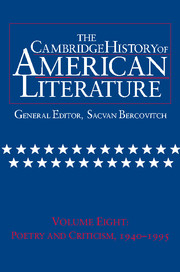Book contents
- Frontmatter
- Introduction
- Poetry, Politics, and Intellectuals
- Criticism since 1940
- Introduction
- 1 Politics and American Criticism
- 2 The Emergence of Academic Criticism
- 3 The Nationalizing of the New Criticism
- 4 The Canon, the Academy, and Gender
- 5 Deconstruction and Poststructuralism
- 6 From Textuality to Materiality
- 7 Cultural and Historical Studies
- Conclusion: Academic Criticism and its Discontents
- Appendix II: Biographies of Critics
- Chronology 1940–1995
- Bibliography
- Index
6 - From Textuality to Materiality
from Criticism since 1940
Published online by Cambridge University Press: 28 March 2008
- Frontmatter
- Introduction
- Poetry, Politics, and Intellectuals
- Criticism since 1940
- Introduction
- 1 Politics and American Criticism
- 2 The Emergence of Academic Criticism
- 3 The Nationalizing of the New Criticism
- 4 The Canon, the Academy, and Gender
- 5 Deconstruction and Poststructuralism
- 6 From Textuality to Materiality
- 7 Cultural and Historical Studies
- Conclusion: Academic Criticism and its Discontents
- Appendix II: Biographies of Critics
- Chronology 1940–1995
- Bibliography
- Index
Summary
Among the postulates of deconstruction that we presented in Chapter 5 was the following:
5. In a society or culture, discourses and explanatory narratives become dominant by repressing counterdiscourses, narratives, and voices that they cannot assimilate. Deconstructive readings attempt to elicit these unwanted “other” stories and show how they haunt the official discourse and thus undo its supposed coherence and inevitability.
We added that “the political efficacy of deconstructive reading strategies (and their link to Marxism, feminism, and other directly sociopolitical forms of criticism) rests on a claim that these strategies can help shake dominant discourses by revealing their repressed contradictions.” Among the issues to which we now turn is the extent to which such claims of political efficacy can be justified.
If they think nothing else about it, media detractors of deconstruction believe that it is politically armed and dangerous. In the preceding chapter, we attempted to defuse some of the polemics and dispel some of the misapprehensions that have long surrounded deconstruction. We ended by agreeing, however, that the deconstructive argument that linguistic meaning is self-divided, performative, and interested “inevitably returns us to politics.” Texts indeed become political, we suggested, when their meanings are understood not to be natural, stable, or simply “there,” but instead determined, and thus “produced,” by particular cultural interests and institutional circumstances, by the clash of social discourses and interpretive systems.
- Type
- Chapter
- Information
- The Cambridge History of American Literature , pp. 389 - 414Publisher: Cambridge University PressPrint publication year: 1996

